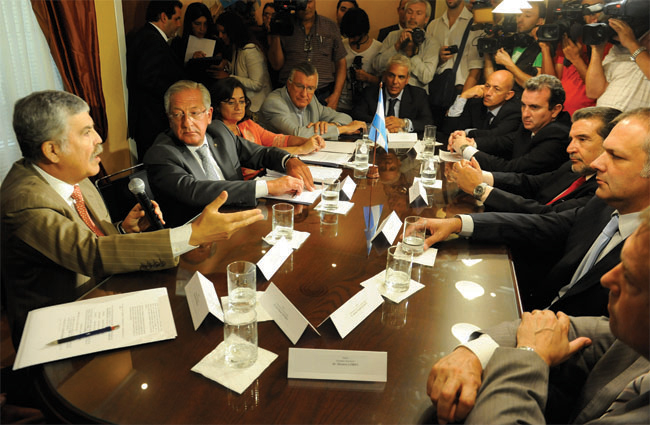Ofemi leaders aim to collect royalties on the mining turnover rather than on pithead value. They are also analyzing the creation of trust funds for infrastructure projects.
Member leaders of Ofemi –the organization that brings together the mining provinces–, will meet by late February in Buenos Aires to define issues related to the distribution of mining revenues. Leaders at the meeting will seek to discuss changes in the tax framework that is affecting the industry. According to a study on the major governments carried out by El Inversor Energético & Minero, the central idea aims at approving at a national level tax advances introduced by San Juan in the past two years.
This is because since 2011, José Luis Gioja’s administration has succeeded in establishing a series of measures that increased their collection of income generated by the activity. Later that year, the governor negotiated with each mining producer to make a change in the methodology used to determine royalties. Thus, taxes started to be directly calculated on the 3% of the companies’ turnover rather than on the pithead value (it allows for production costs tax deductibles), in accordance with the Mining Code. Such decision has increased provincial revenues on this concept by 30%.
In addition, Gioja has created trust funds that collect 1.5% of the turnover from metal producers located in the province, e.g. Barrick, Yamana Gold and Troy Resources. Money is used to finance infrastructure projects, mainly in the municipalities and regions where mining projects are sited.
Governors
So, facing a tough year regarding fiscal and budgetary issues, just like 2012, the rest of the mining governors –with Ofemi’s President Eduardo Fellner from Jujuy, Lucia Corpacci (Catamarca), Juan Manuel Urtubey (Salta) and Luis Beder Herrera (La Rioja) taking the lead–, wishes to repeat that model in their provinces. Sources close to the Ofemi stated that efforts to add Santa Cruz as full member of this organization continue, since it has three active metal mines.
“We need to introduce some postponed tax changes among all provinces,” said a governor who asked to keep his name confidential. In turn, governors will try to design joint venture schemes between state-owned enterprises and private mining companies, which is one of the future goals promoted by the national government. Last year, for instance, the state-owned mining Jemse, in Jujuy, had a stake of 8.5% in the lithium project promoted by Orocobre and Toyota.
Hence, several provinces will promote –or are in the process of doing so, the creation of state–owned mining companies in pursuit of partnerships with private investors. In San Juan, for example, Gioja’s government will redraft, in the coming months, the statute of the Instituto Provincial de Exploraciones y Explotaciones Mineras (IPEEM), the mining institute of that province, in order to participate in ore and industrial projects to be carried out in the future




